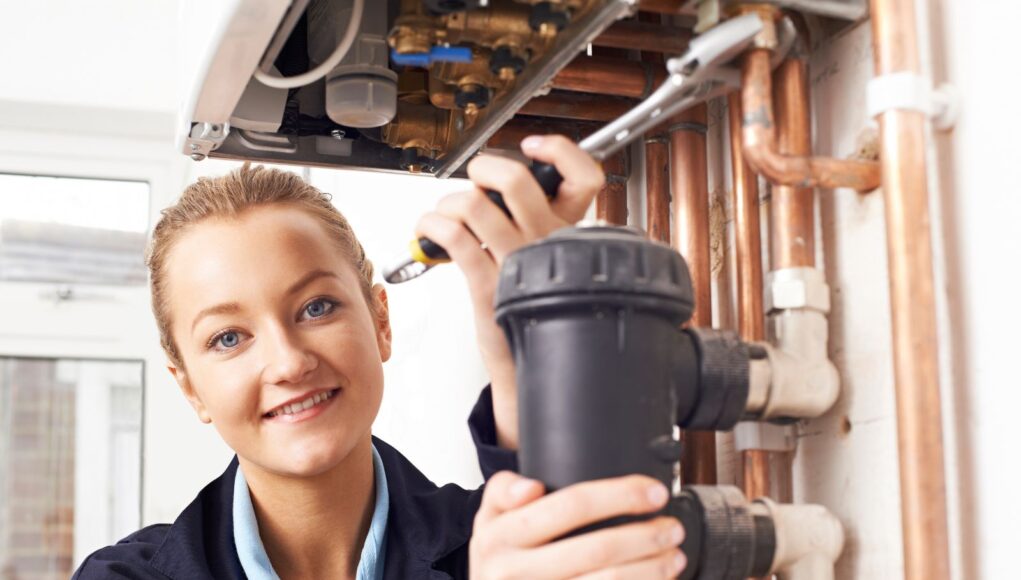Boiler Replacement is an excellent method to increase your home’s comfort and efficiency. Boiler systems are integral to many homes, providing heat and hot water year-round. However, like any mechanical system, boilers can eventually break down or become less efficient over time. When it’s time to replace your boiler, choosing the suitable model for your home and needs is essential. This process can be difficult, but with the help of a qualified contractor, it can go smoothly. If you’re considering to change the boiler, here are a few things to remember.
Table of Contents
The different types of boilers available
Boiler replacement can be daunting, but choosing the right boiler for your home is essential. There are multiple kinds of boilers available in the market, each with its own set of benefits and drawbacks.
Here is a brief overview of some of the most popular types of boilers:
Condensing Boilers
They are highly efficient, meaning they use less energy and cost less to operate. They also have lower emissions than other types of boilers, making them a good choice for homes concerned about their environmental impact. However, condensing boilers require regular maintenance to keep them running correctly, and they may not be suitable for homes with low water pressure.
Combi Boilers
These are a popular choice for smaller homes as they take up less space than other types of boilers. They also don’t require a separate hot water cylinder, making them more affordable and easier to install. However, combi boilers may not be powerful enough to meet the needs of larger households, and they may not be worthy for homes with low water pressure.
Conventional Boilers
One of the most widely used boiler types in the UK. They’re simple to install and maintain and are typically more affordable than other boilers. However, conventional boilers aren’t as efficient as other types of boilers, so they may cost more to operate over time. In addition, conventional boilers require a hot water cylinder, which takes up additional space in your home.
It’s crucial to choose the right boiler for your home that should be made with care. Be sure to consult with a qualified heating engineer to ensure you select the best option for your needs.
How to select a suitable boiler for your home?
Every home needs a boiler however; it can be challenging to identify which model is best for your needs considering the wide variety of options available. Here are a few things to keep in mind when Boiler Replacement:
- First, consider the size of your home. A larger home will need a more powerful boiler to heat it effectively.
- Second, think about how much hot water you use on a daily basis. If you have a large family or frequently entertain guests, you’ll need a boiler that can provide ample hot water.
- Third, take into account your budget. Boilers vary widely in price, so it’s crucial to find one that fits your financial needs.
- Finally, consult with a professional. An expert HVAC specialist can assist you in choosing the perfect boiler for your home and installing it quickly and efficiently. With their expert guidance, you can be sure that you’re making the best decision for your home.
The cost of replacing a boiler
Boiler Replacement costs can vary depending on a few factors. Boiler size, for example, will have a significant impact on cost. A standard boiler typically heats 80-100 liters of water, whereas a system boiler heats the same amount of water but also stores it in a cylinder.
Boilers also come in different efficiency ratings, with the more expensive models. Another factor that will affect the cost is the type of fuel you use to power your boiler. Gas and oil boilers are typically cheaper to run than electric boilers, although the initial cost of an oil boiler may be higher.
The cost of installation is also something to consider when replacing your boiler. If you need a completely new system, it will cost more than just replacing the boiler. Boiler replacement is a big financial commitment, so getting quotes from multiple suppliers is essential before deciding.
Conclusion
Boiler replacement can be an intimidating task. But it will not be with the proper guidelines. We’ve outlined what you need to consider when making this decision and looked at some of the different types of boilers available on the market. We hope that the information provided has made your choice easier. If you are still unsure which boiler is right for you, please leave us a comment below; we would be happy to help.
Apart from this, if you want to know about Costs Associated With a New Combi Boiler Installation then please visit our Business category















